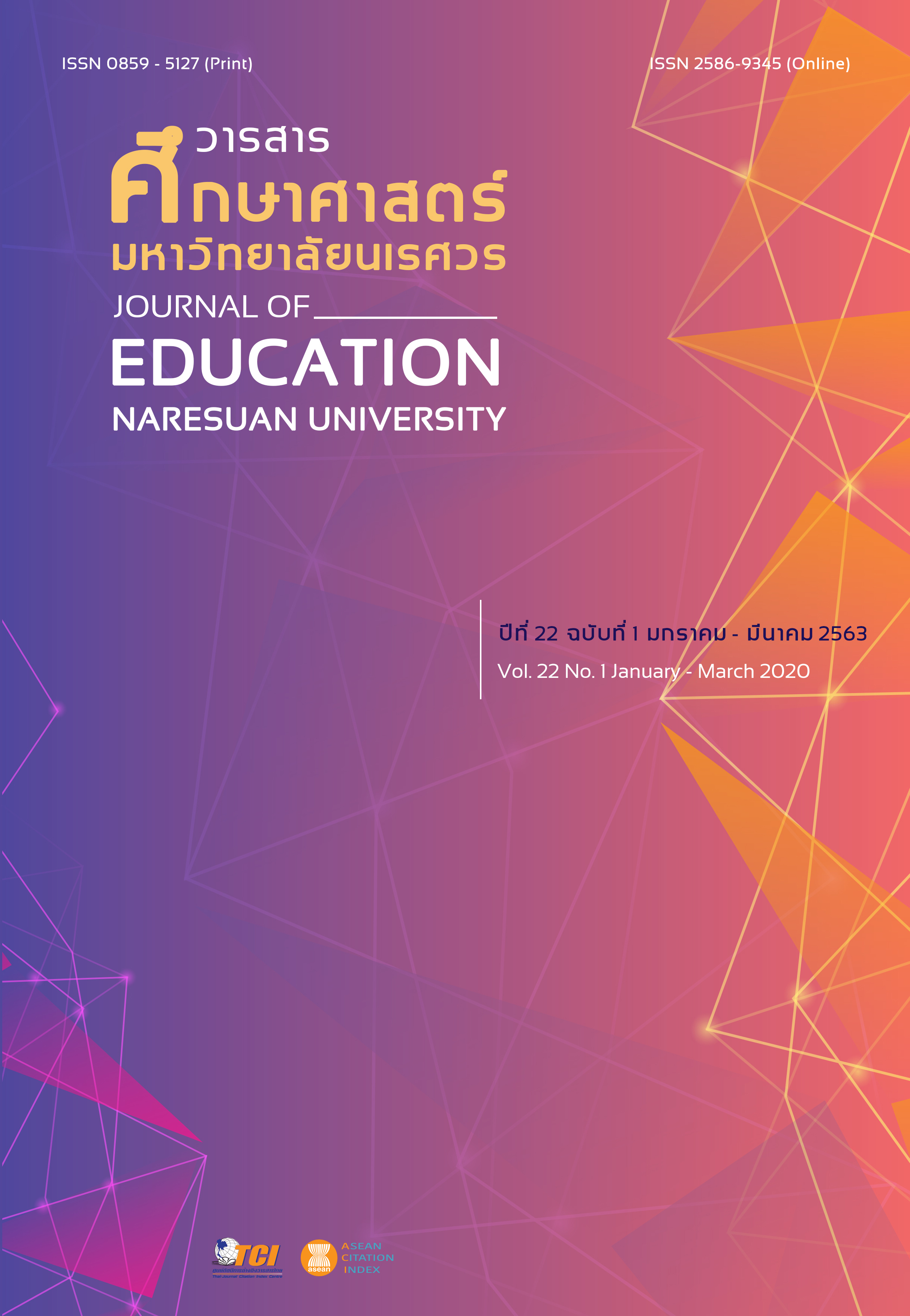A COMPARISON OF LEARNING ACHIEVEMENT IN SCIENCE, PROBLEM SOLVING ABILITY, AND SCIENTIFIC MIND OF MATTAYOMSUKSA 3 STUDENTS USING BETWEEN PROBLEM-BASED LEARNING AND CONVENTIONAL LEARNING MANAGEMENTS
Main Article Content
Abstract
The purpose of this research was to compare scientific learning achievement, ability of problem solving and Scientific mind of Mattayomsuksa 3 students between problem-based learning and traditional learning managements. The participants in this study was Mattayomsuksa 3 students in the second semester of the 2016 academic year at Piboonbumpen Demonstration School, Burapha University. The sampling, by using Cluster Random Sampling, was divided into 2 classes: One class for the experimental group consisted of 36 students that was instructed by using problem-based learning and other class for the control group consisted of 34 students was instructed by using traditional learning management. The research instruments were lesson plans based on problem-based learning, lesson plans based on traditional learning management, learning achievement test, ability of problem solving test, and Scientific mind test. The data were statistically analyzed by using mean, standard deviation, and independent t-test. The findings of this research are as follows:
1. The scientific learning’s students achievement, after they were taught by using traditional learning management, was higher than the students were taught by using problem-based learning at the .05 significant level.
2. The problem solving’s students ability, after they were taught by using problem-based learning, was higher than the students were taught by using traditional learning management at the .05 significant level.
3. The scientific mind’s students, after using problem-based learning management, was higher than the students were taught by using traditional learning management at the .05 significant level.
Article Details
The owner of the article does not copy or violate any of its copyright. If any copyright infringement occurs or prosecution, in any case, the Editorial Board is not involved in all the rights to the owner of the article to be performed.
References
Arwusosakul, P. (2014). The effect of learning biology management by using the problem-based learning method to enhance biology achievement and problem solving ability for student in Matthayomsuksa 5 (Master thesis). Chonburi: Burapha University. [in Thai]
Katkarn, P., Srisanyong, S., & Singlop, S. (2017). the effects of problem-based learning for developing science learning achievement, problem solving abilities and scientific attitude of Prathomsuksa 6 students. Journal of Education Naresuan University, 19(1), 77-89. [in Thai]
Kumyoung, K. (2012). The Result of Inquiry Approach (5E) to Develop as Thoughtfulness, Learning Result and Science Mind, Substance for Science Learning for Prathomsuksa 6 (Master thesis). Chiang Rai: Chiang Rai Rajabhat University. [in Thai]
Laohapaiboon, P. (1999). Science teaching. Bangkok: Wattanapanich. [in Thai]
Leekitwattana, P. (2013). Educational research. Bangkok: Mean Service Supply. [in Thai]
Ministry of Education. (2009). Metric and core topic material to learn the science of the basic education core curriculum B.E. 2551. Bangkok: The Agricultural Co-operative Federation of Thailand. [in Thai]
Nation Institute of Educational Testing Service (Public Organization). (2015). Summary of the results of Ordinary National Educational Test (O-NET) Mattayomsuksa 3 academic year 2015. Retrieved April 27, 2016, from https://www.onetresult.niets.or.th/AnnouncementWeb/Login.aspx [in Thai]
Nissaikla, S., Chookhampaeng, C., & Khamkhong, S. (2012). Comparisons of learning achievement, learning entitled local food problem solving skills and attitudes toward of Prathomsueksa 6 students who learned using CIPPA model learning activities and problem-base learning model. Journal of Education Mahasarakham University, 6(3), 28-38. [in Thai]
Office of the Education Council. (2007). Problem-base learning. Bangkok: The Agricultural Co-operative Federation of Thailand. [in Thai]
Phanmanee, A. (1999). Psychology of teaching. Bangkok: Ton Or 1999. [in Thai]
Sujjanan, J. (2011). Lifelong education and community development. Bangkok: Odeon Store. [in Thai]
Thammabut, M. (2002). Problem-based learning. Academic Journal, 5(2), 11-17. [in Thai]
The Institute for the Promotion of Teaching Science and Technology. (2002). Learning management manual for learning area of science. Bangkok: Department of Academic. [in Thai]
The Institute for the Promotion of Teaching Science and Technology. (2013). PISA 2012 evaluation results mathematic reading and science conclusion for administrator. Bangkok: Advanced Printing Service. [in Thai]
Witthaya, S., et al. (2013). Development of solving science problem and scientific reasoning by using problem-base learning. Journal of Humanities and Social Sciences Mahasarakham University, 32(3), 70-82. [in Thai]
Ya-anan, R., Onthanee, A., & Kaewurai, W. (2016). A comparison of the effects in science learning of students with the different learning styles by inquiry method and cooperative learning method. Journal of Education Naresuan University, 18(1), 166-174. [in Thai]


